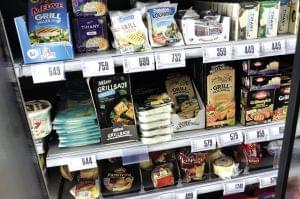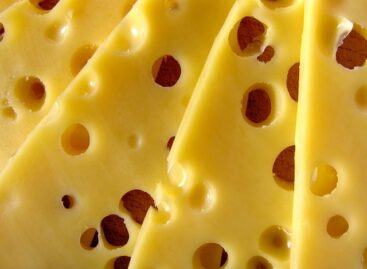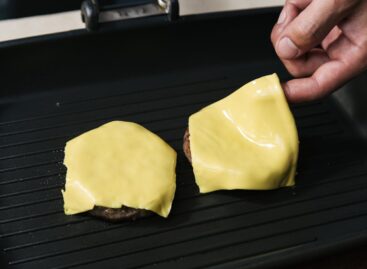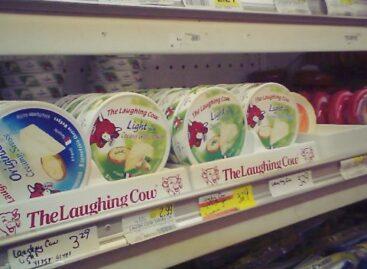Magazine: Cheese can also be enjoyed hot
Cheese sales grew dynamically (by 6 percent in volume and 12 percent in value) last year. There were several reasons behind this trend – one of these is that the cheese market isn’t saturated yet, as the 6.3kg/year per capita consumption is way below the European average. Another reason is that manufacturers have already started preparing for the stricter rules of the Food Book for Trappist cheese, which will enter into force from 2022, positioning their products higher in the segment.
In line with the trends

Andrea Marton
marketing director
Savencia Fromage &
Dairy Hungary
A third reason of the good sales performance is the COVID-19 pandemic, as people spending more time at home has generated higher sales.
Andrea Marton, Savencia Fromage & Dairy Hungary Zrt.’s marketing director told our magazine that cheese is a convenience product that can be enjoyed in many ways, even as a snack. Since the flexitarian diet is more and more popular, the position of cheese is also strengthening as an alternative to meat. Consumers keep discovering the many opportunities offered by cheese, for instance it can be consumed hot (as an ingredient of dishes) or seasonally (grilled cheese). Although Trappist is still the most popular cheese variety, soft and special products see their sales increase, too.
Category building plans
When developing new products, in the area of packaging Savencia is moving in the direction of cheese which is easy to use, while in the field of consumption the main direction is hot usage. As cheese products for grilling and frying are very popular, the company is trying to be present in these segments with basically all of its brands.

Even if consumption still keeps centering around Trappist cheese, certain smaller cheese types are also dynamically thriving
This year they rolled out Medve grill cheese in plain and chilli versions. Since Tihany grill camembert with various sauces was very popular last year, in 2021 Savencia launched the product’s garlic sauce variant. Savencia will add new products to the Karaván smoked cheese range – a winter version will hit the shops, which comes with a seasonal sauce and can be prepared in a frying pan. New lactose-free Medve products are also about to appear on store shelves.
Adapting to the situation

András Lengyel
managing director
ERU Food Trading
András Lengyel, managing director of ERU Food Trading Kft. called our attention to how much the pandemic changed consumption habits, how often people go shopping, the way they shop and the basket size. Both stores and the company’s sales team had to adapt to the new situation. Visibility of products in-store is now more important than ever before.
When speaking about the company’s Camping brand, the managing director highlighted lactose-free cheese products, for which demand is constantly on the rise. More and more consumers are aware of food intolerance and because of this they can now realise its symptoms in themselves.
In waiting

Carlo Volpe
managing director
Óvártej
Carlo Volpe, managing director of Óvártej Zrt. informed Trade magazin that after the hardships in the retail and HoReCa sector caused by the pandemic, currently they are waiting to see how the market situation will develop after the summer of 2021. In planning they now take into consideration how quickly the trends and habits can change. The company introduced its premium quality OLATT-Fiordilatte-Taglio Napoli cheese to the market in 2020, sales of which were very good in both Hungary and abroad.
Health preservation with product quality

Balázs Molnár
head of sales
Szarvasi Agrár
Due to the pandemic Szarvasi Agrár Zrt. could only launch its new cheese brands with a 6-month delay. Head of sales Balázs Molnár told Trade magazine: they transformed products in a way to facilitate and speed up shopping in physical stores. COVID-19 has made consumers care about their health more, so Szarvasi Agrár Zrt. is focusing on making cheese from natural ingredients, meeting even the strictest Hungarian GMO-free requirements too.
Future plans include developing lactose-free and easy-to-prepare cheese products for grilling and coating in breadcrumbs. Both shoppers and the trade reacted very positively to the company’s Cervinus cheese brand. This year’s biggest success story was Serpenyős Grill Cheese products. New flavours can be expected from both product ranges. //
News about stricter rules transformed the market of cheap cheese
In early 2020 the National Food Chain Safety Office (NÉBIH) announced plans to introduce stricter rules for which cheese varieties can be called Trappist cheese from 2022, and this idea has already affected the market.


Guest author:
Máté Komáromi
product specialist
Consumer Panel Services
Based on data from GfK’s 4,000-household panel, we can say that the importance of the so-called cheap cheese segment (the other two being mainstream and premium) has decreased in the last 3 years. What is more, Trappist cheese – which used to dominate in the cheap segment – saw its volume share reduce. However, from the 8,500 tons of product that disappeared from the segment 7,500 turned up in the mainstream cheese category, which means that Trappist cheese has basically been repositioned.
In discount supermarkets two years ago mainstream cheese products realised 38 percent of sales, but today their share is already 50 percent. The question is: when the new rules enter into force, will the price of Trappist cheese increase more or will similar products with a different name become popular? //
Related news
Supermint grilled cheese test: some quality and labeling errors – official measures have been initiated
🎧 Hallgasd a cikket: Lejátszás Szünet Folytatás Leállítás Nyelv: Auto…
Read more >Related news
The Hungarian Food Book is 50 years old
🎧 Hallgasd a cikket: Lejátszás Szünet Folytatás Leállítás Nyelv: Auto…
Read more >ZEW: Economic expectations worsened in Germany and the euro area in February
🎧 Hallgasd a cikket: Lejátszás Szünet Folytatás Leállítás Nyelv: Auto…
Read more >







